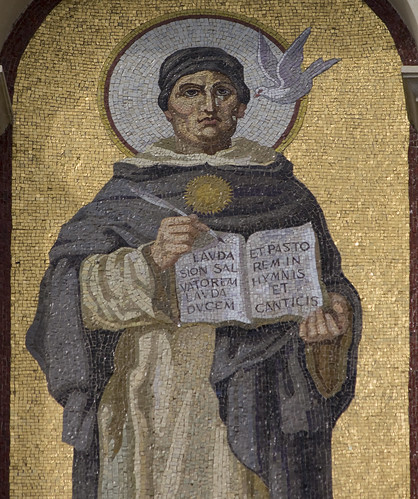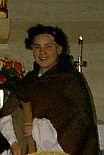From Medieval Saints on Yahoo.
Thomas, son of the count of Aquino, (b. 1225-d. 1274) was first
trained at the Benedictine abbey of Montecassino, and here, even in
childhood, his great mind was wrestling with theological questions,
“Master, tell me–what is God?” In order to better to train the boy’s
mind, his father sent him at an early age to the University of Naples.
There he studied under Peter of Ireland and, undisturbed by the noise
and wickedness of the great university city, proceeded rapidly on his
quest for God.
Meeting the Dominicans, he was strongly attracted by their apostolic
life and petitioned to be received as one of them. While recognizing
the gifts of the young student, the friars refused him admittance to
the Order until he was eighteen. Acting deliberately, without a
backward glance at the power and wealth he was leaving, Thomas, at
eighteen, joyfully put on the habit of the new Order.
Like many gifted young men, Thomas was bitterly opposed by his family
when he attempted to become a religious. When both threats and
persuasion failed, he was kidnaped by his brothers and locked in a
tower for more than a year. His sisters were sent to influence him,
and he proceeded to convert them to his own way of thinking. A woman
was sent to tempt him; but he drove her from the room with a burning
brand from the fire; afterwards, angels came to gird him with the
cincture of perpetual chastity. When captivity failed to break his
determination, his brothers relaxed their guard, and Thomas, with the
help of his sisters, escaped from the tower and hurried back to his
convent.
Thomas was given the finest education available in his day. He studied
first at Cologne and later at Paris, under the Master, Albert the
Great. This outstanding Dominican teacher and saint became his
lifelong friend and loyal defender. They taught at Cologne and became
a mutual influence for good in one of the most beautiful friendships
in Dominican history.
For the rest of his life, Thomas was to teach and preach with scarcely
a day of rest. What makes the amount of writing he did remarkable, was
the great deal of traveling that he undertook. Death found him in a
familiar place, on the road, where he was bound for the Council of
Lyons in obedience to the pope’s command. He died at the Cistercian
Abbey of Fossanova, in a borrowed bed, obscurity hardly fitting the
intellectual light of the Order, but perfectly suited to the humble
friar that Thomas had always been.
Overheard in a colloquy with the Master he served so well with heart
and mind and pen, Thomas was heard to ask as his reward from the Lord,
“Thyself, 0 Lord, none but thyself!”
St. Thomas Aquinas is a Doctor of the Church and is honored as the
patron of Catholic Schools. He is celebrated in the Church Calendar on
January 28th.
St. Thomas Aquinas was walking outside and two nuns rushed up to him with a great big bound tablet. They asked St. Thomas if he would be so kind, in his spare time, to write out all that was necessary for the nuns to do so that they could make it into heaven.
St. Thomas graciously agreed and took the volume from the sisters. They were very grateful and left with high hopes that perhaps he could finish this big task within a decade or so.
To their great surprise, St. Thomas showed up the next day, with the tablet, and told them that he had finished the work! The nuns were stunned, but they thanked the saint and took the volume, rushing back to the convent to see all of the words that he had written.
They opend the first page and this was all that was written:
How to Get to Heaven – Will It!!!
In other words (quite a few more “other words!”) we all have the ability to make it to heaven, but we have to want to do so, and we have to will ourselves above and out of our own way to get there!
Other words of wisdom from the saint:
Nor has the Church failed before the assaults of demons: for she is like a tower of refuge to all who fight against the Devil.
The things that we love tell us what we are.
To one who has faith, no explanation is necessary. To one without faith, no explanation is possible.
There is nothing on this earth more to be prized than true friendship.





